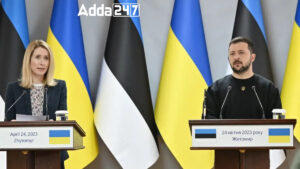The Group of Seven (G7) foreign ministers’ meetings held this week have taken center stage in addressing the Israel-Hamas conflict and the ensuing humanitarian crisis in Gaza. U.S. Secretary of State Antony Blinken emphasized the importance of member countries speaking with “one clear voice” in response to these critical issues.
Japan Takes the Helm of G7 Meetings
- Japan, which chairs this year’s G7 meetings, hosted the discussions on Tuesday and Wednesday in Tokyo.
- The timing of these meetings is significant, given the growing calls for humanitarian pauses in the Gaza war.
- U.S. Secretary of State Blinken engaged in bilateral talks with Japanese Prime Minister Fumio Kishida and Foreign Minister Yoko Kamikawa.
Japan’s Strong Stance on the Gaza Conflict
- Foreign Minister Kamikawa opened the meetings by expressing Japan’s unequivocal condemnation of “terrorist attacks by Hamas and other Palestinian militants” that occurred on October 7.
- Japan also expressed its hope for the early release of hostages held by Hamas, some of whom are U.S. citizens. Kamikawa commended the diplomatic efforts made by the United States in addressing the Israel-Palestine situation, pledging Japan’s utmost support.
- Additionally, Kamikawa stressed the importance of the close unity between Japan and the U.S., particularly in the face of various challenges in different regions of the world, including Ukraine and East Asia.
G7 Unity and International Law
- Secretary Blinken echoed the sentiment of unity within the G7, emphasizing the necessity for all member countries to come together and speak with one clear voice regarding the Gaza crisis.
- Japan has called for adherence to international law by all direct parties involved in the conflict and advocated for de-escalation.
- Furthermore, Japan has committed funds to help alleviate the dire humanitarian needs in the Gaza Strip.
Calls for Humanitarian Truce and Cease-Fire
- French Foreign Minister Catherine Colonna reiterated the call for an “immediate humanitarian truce” in Gaza. She emphasized that this truce should ultimately lead to a cease-fire.
- The United States also supports humanitarian pauses in Gaza, but it has rejected a complete cease-fire. U.S. officials argue that a cease-fire could provide an opportunity for Hamas militants to regroup and plan future attacks.
- The possibility of tactical pauses in the Israeli offensive was discussed, with the aim of ensuring the safe departure of civilians from targeted areas. However, Netanyahu has maintained that there will be no cease-fire until the hostages held by Hamas are released.
G7 Stance on Civilian Casualties and Israeli Actions
- While G7 members have increasingly emphasized the need to minimize civilian casualties, they have largely avoided direct criticism of Israeli actions in the conflict.
Broader Agenda: Ukraine, Energy, and Regional Security
- Apart from addressing the Israel-Hamas conflict and the Gaza crisis, U.S. Secretary of State Blinken’s talks with Japanese officials also encompassed discussions on supporting Ukraine’s economic recovery, addressing energy needs, and enhancing regional security.
Global Engagement
- Before the G7 meetings in Japan, Secretary Blinken had undertaken a comprehensive tour of the Middle East, including visits to Israel, Jordan, the West Bank, Iraq, and Turkey.
- During these visits, he reaffirmed Washington’s commitment to humanitarian pauses in Gaza, enabling the delivery of life-saving aid to civilians.
Find More International News Here



 Zelenskyy and Estonia’s New PM Discuss...
Zelenskyy and Estonia’s New PM Discuss...
 Ronald L. Rowe Jr. Named Acting Chief of...
Ronald L. Rowe Jr. Named Acting Chief of...
 Rahaab Allana Honored with French Arts a...
Rahaab Allana Honored with French Arts a...
